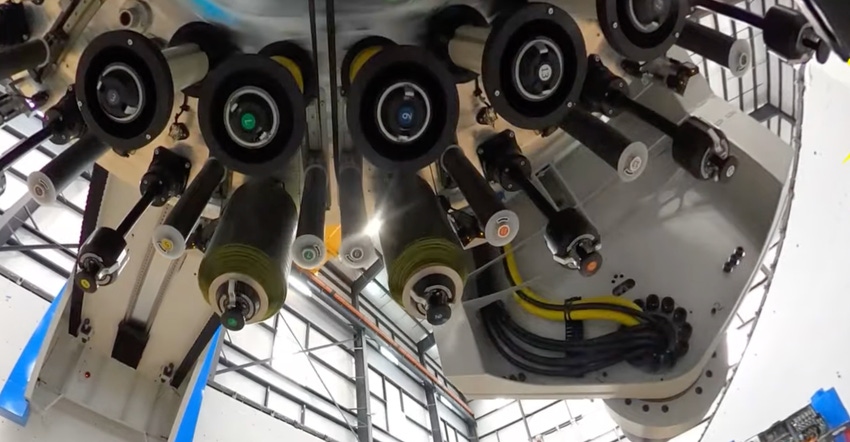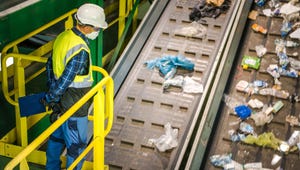PAEK-based resin system dovetails with machinery, tooling to boost productivity four- to six-fold, enabling out-of-autoclave processing with near-zero porosity.
September 10, 2021

A joint development effort between processing equipment vendor Electroimpact, materials supplier Toray Advanced Composites, and toolmaker Janicki Industries has reportedly achieved a leap forward in the high-speed manufacture of large thermoplastic composite parts. The project has resulted in the development of automated, cost-effective processing technologies that can manufacture large-scale thermoplastic parts at high-speed deposition rates up to 4,000 inches (100 meters) per minute.
High-speed automated fiber placement (AFP) equipment from Electroimpact has been enhanced for processing polyarlyetherketone (PAEK) thermoplastic when coupled with a variable spot size laser system. This device uses a range of processing temperatures for robust process control across individual rows to accommodate severe contours while enabling thermoplastic composite parts to be repairable during AFP layup, thereby reducing risk of wastage during part manufacture.
Cetex TC1225 low-melt PAEK (LMPAEK) uni-directional tape from Toray Advanced Composites was selected to optimize processing. The material reportedly enables the production of highly consistent, quality parts while eliminating the need to wet-out fiber bundles during the consolidation cycle, allowing out-of-autoclave processing with near-zero porosity. Combined with a relatively low processing temperature when compared to other PAEK-based systems — 340°C (644°F), which is up to 60°C (108°C) lower than conventional PAEK — the Toray Cetex grade enables a faster layup speed while achieving comparable mechanical properties.
Processing speeds of up to 4,000 IPM have been achieved with light or heavy tack levels to guarantee part geometry. “When these advancements are combined with increased AFP reliability, in-process real-time inspection, and maintenance intervals, the resulting AFP 4.0 processing increases current productivity four- to six-fold,” said Michael Assadi, Chief Engineer at Electroimpact.
To maximize production efficiencies, the AFP layup is formed directly onto an out-of-autoclave heated tooling system engineered by Janicki Industries, which is then fully consolidated in situ, achieving a complete thermal process cycle in less than one hour. The tooling system is designed for scalability to accommodate parts that are too large for traditional heated press applications. Significantly faster cycle times are achieved than would be possible with high-temperature autoclaves.
“The key to this technology is rapid heating and cooling rates with edge-to-edge uniformity throughout the process,” stated Todd Chace, Director of Research and Development at Janicki. “Complete consolidation under vacuum bag only pressure is achieved by controlling the key stages of melt, flow, and crystallization with precise temperature control.”
“Individually, each of these technologies represents a step forward in thermoplastic composite processing,” noted Steve Cease, VP Technology & Strategic Marketing at Toray Advanced Composites. “When combined, a major leap in large-scale, rapid part fabrication is achieved, underlining the importance of partnerships across the value chain to advance the adoption of thermoplastic composites into industry.”
About the Author(s)
You May Also Like




